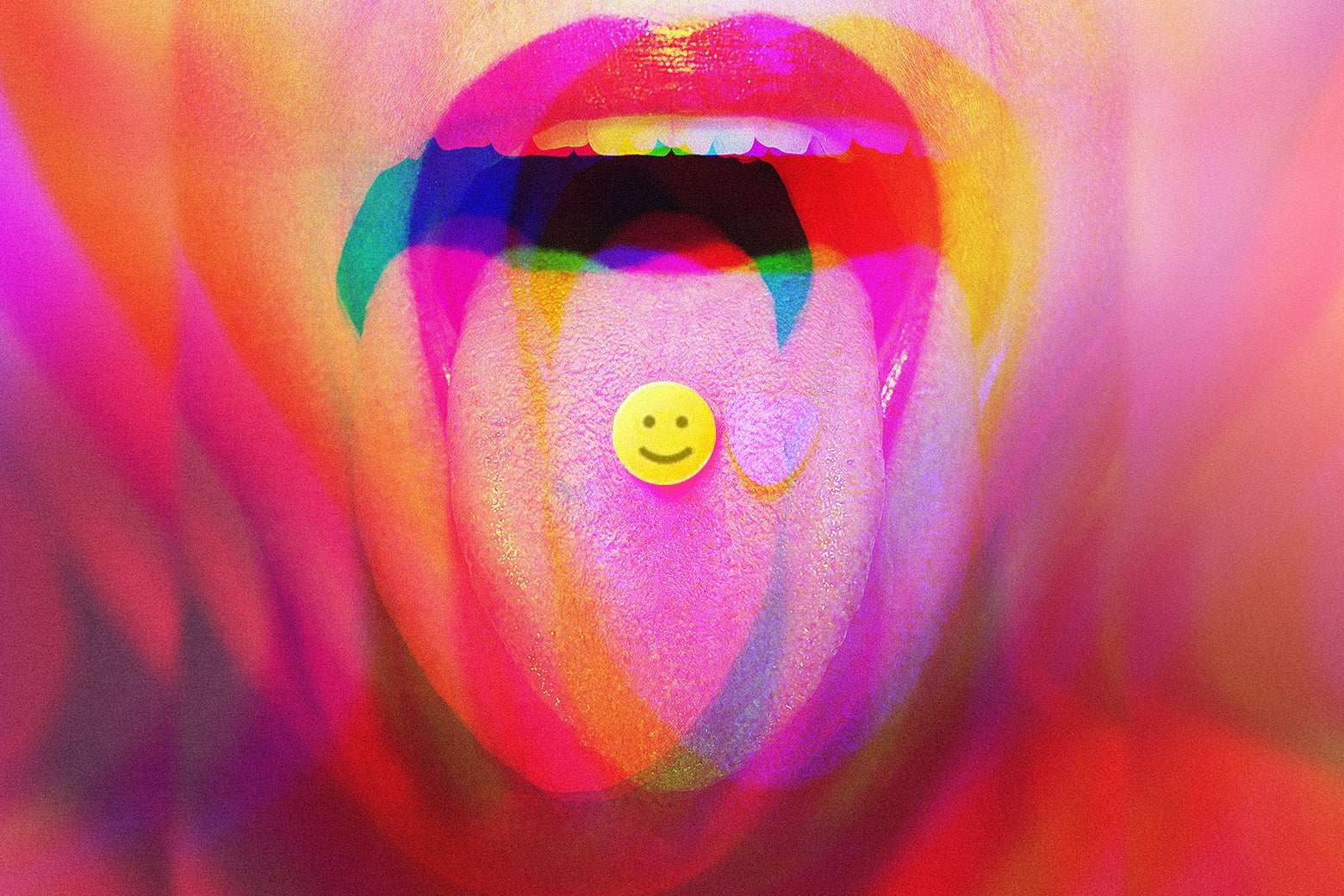What was supposed to be a groundbreaking step in mental health treatment became a devastating rebuke of a biopharmaceutical company at the forefront of researching MDMA-assisted therapy as a treatment for post-traumatic stress disorder. Although many psychedelic-therapy advocates were disappointed by the decision, the move could actually prevent serious harm to those seeking treatment—and ultimately help secure a safe future for psychedelic-assisted therapy.
On June 4, a panel advising the Food and Drug Administration voted 9–2 that Lykos Therapeutics, a company developing psychedelic drug treatments for mental health issues, had not proved that its MDMA-assisted therapy protocol was an effective treatment for PTSD, and voted 10–1 that the risks of MDMA—also known as ecstasy—outweigh its benefits. The FDA will officially vote Aug. 11 on whether to approve the treatment. The agency isn’t required to follow the panel’s recommendation, but given the magnitude of the safety concerns raised by the committee, and the landslide votes, FDA approval would be a fairly stunning turn of events.
For nearly four decades, the nonprofit Multidisciplinary Association for Psychedelic Studies has been the leading advocate for the legalization and medicalization of psychedelic drugs like MDMA, psilocybin, and LSD. In 2014 MAPS created Lykos Therapeutics (formerly MAPS PBC) as a for-profit drug development company. MAPS and Lykos have invested heavily in clinical trials evaluating the therapeutic potential of MDMA. Taking into account the anemic treatment landscape and the panel’s support of veterans’ groups, many observers expected the body to offer a resounding approval.
However, June 4 was unequivocally a “very bad day for Lykos,” Mason Marks, a visiting professor of law at Harvard Law School and lead of the Project on Psychedelics Law and Regulation at the Petrie-Flom Center for Health Law Policy, Biotechnology, and Bioethics, tells me. “Lykos largely created this situation for themselves.”
There were two prongs to Lykos’ clinical trials: MDMA as a drug, and the psychotherapy process before, during, and after the MDMA dosing sessions. The panelists roundly criticized both. Many of the concerns the group discussed had been brought to the attention of MAPS and Lykos during and after the trials by advocates, researchers, and even the FDA. For example, in 2016 the FDA recommended that MAPS use an active compound (as opposed to an inactive placebo) for the trial’s control group to better obscure who received the drug and who didn’t, but the nonprofit decided against it.
This “functional unblinding”—when a trial participant becomes aware of whether they’ve been given the drug being studied or a placebo—resulted in more than 90 percent of participants in the MDMA group in the Phase 2 trials realizing that they’d received MDMA, and 75 percent of the control group realizing that they hadn’t. It makes sense. If you understand anything about the popular drug, which is known to create feelings of immense euphoria and sensitivity to light, sound, and touch, you’re probably going to detect whether you’ve just taken it.
However, the advisory committee maintained that functional unblinding alone wouldn’t have been a dealbreaker. “There are so many problems with the data,” Melissa Barone, a psychologist with the VA Maryland Health Care System, said during the committee’s discussion. “Each one alone might be kind of OK. But when you pile them on top of each other … there are just a lot of questions still about how effective and durable the treatment is.”
The FDA advisory committee also had plenty of concerns about Lykos’ second treatment arm, psychotherapy. MAPS and Lykos repeatedly made it clear that MDMA was only part of what made their treatment effective. Discussing the trials last year, MAPS founder Rick Doblin said in an interview in Nature, “The results that we got were not from MDMA. They were from highly trained therapists who are then using MDMA.”
Crucially, however, the FDA does not regulate psychotherapy. So Lykos is asking it to approve a medication-therapy combination when half of the process doesn’t even fall under the agency’s purview. Instead of suggesting that the FDA label the medication as “part of a treatment plan that includes counseling and psychosocial support”—as the agency did with Suboxone, a drug for opioid use disorder—Lykos asked that its specific psychotherapy process be included in the approval procedure. If the FDA approves Lykos’ application in August, it would be the first time in the agency’s history that a psychotherapeutic process was approved alongside a drug treatment.
“I don’t have any ill will toward Lykos, and I strongly believe in the therapeutic potential of MDMA,” Marks says. “But I’m a bit mystified by why [Lykos] insisted on framing it as a therapy-drug combo when they know full well that the FDA doesn’t and cannot think of it that way. And I think all of the committee was a bit mystified by that as well.”
Even if psychotherapy were under the FDA’s jurisdiction, serious questions remain about Lykos’ therapeutic protocol. David Millis, a clinical reviewer for the FDA, raised concerns about the standardization of therapy at the advisory committee meeting, saying, “The content or approach of these integrated sessions was not standardized in the treatment manuals and was mainly left up to the individual therapist.”
The therapeutic practices behind Lykos’ protocol may not be standardized, but the ideology behind them is. Doblin has publicly stated that “the entire therapeutic approach that we have in the MDMA studies” is based on Stanislav Grof’s transpersonal spiritual teachings. Grof believed in the idea of “inner healing intelligence,” accessed through psychedelics.
When considered in this context, it’s astonishing that Lykos is requesting that the FDA for the first time approve a psychotherapy process alongside a drug and asserting that the treatment is rooted in “transpersonal, spiritual teachings.”
In a public comment to the advisory committee hearing, Nese Devenot, a senior lecturer at Johns Hopkins University with expertise in psychedelic bioethics, outlined concerns with the Grofian underpinnings of MAPS’s/Lykos’ therapy protocol. Devenot argued that the system “primes study participants to interpret any outcome as successful,” even if it results in “ongoing and distressing” symptoms. This may lead participants to think that distress is healing—even if it’s actually causing harm.
This sentiment is reflected in MAPS’s handbook detailing MDMA-assisted therapy protocols for PTSD. The guidelines are clear that a therapist should not touch a patient without their consent, but they don’t address the fact that, legally and ethically, a person cannot give consent while under the influence of a psychedelic drug. Further, there are confirmed examples from MAPS’s/Lykos’ MDMA trials in which a therapist explicitly overrode the will of a participant and initiated physical contact while the patient was on MDMA, even after it became clear that such contact was further upsetting them. In an incident from 2015, study facilitators sexually assaulted trial participant Meaghan Buisson during an MDMA dosing session.
A video of the session shows both therapists, Donna Dryer and Richard Yensen, hugging and cuddling Buisson and Yensen lying on top of her while she’s obviously distressed and resisting touch. Notably, her PTSD stemmed from previous sexual assaults. MAPS said it didn’t review the videos from Buisson’s sessions until 2021—six years after they were filmed and three years after Buisson filed a complaint with the organization. Between MDMA dosing sessions, she attempted suicide.
Buisson says MAPS was aware of the incident but never reported it as an adverse event in its trial results, an allegation echoed by another participant about his own suicidality during the trial and by two former MAPS BPC staff members about a participant in the Phase 3 trial. Over the next year, Dryer and Yensen’s abuse of Buisson escalated. In 2019 MAPS released a statement asserting that the therapists “substantially deviated from MAPS protocol.”
Buisson told me that the way MAPS handled the incident suggests that it should not be a facilitator of this kind of therapy. “MAPS is not an organization that understands trauma-informed care,” she says. “Assault is not a therapeutic modality. Sexual assault is not a therapeutic modality. Pinning someone down as they are screaming ‘No’ for hours is not trauma-informed care.”
PTSD is a major, prevalent public health concern that desperately needs new treatment. MDMA and other psychedelics are potentially lifesaving treatments that demand the FDA’s serious consideration. But serious consideration requires high evidentiary standards—to do otherwise would be unfair to the people who need help and to everyone who relies on the FDA to rigorously evaluate the safety and efficacy of drugs before approving them.
The agency doesn’t have a spotless track record in this department, as many critics of the advisory panel’s decision were quick to note. David Nutt, a psychedelics researcher at Imperial College London, told Science that the decision “calls into question a regulatory system that allows new versions of potentially lethal opioids for pain yet denies the most novel and safe intervention for treatment-resistant PTSD ever seen.”
But mistakes in the FDA’s approval history should illustrate the dangers of rubber-stamping drugs without proper evaluation, not diminish the importance of rigorous standards. Considerable harm can be inflicted upon patients when the agency gets it wrong. Further, if Nutt is correct about MDMA, it shouldn’t be too hard to provide the FDA with bulletproof data. Instead, Lykos conducted trials that ignored the agency’s recommendations and failed to follow best (and basic) practices, like taking and evaluating participants’ blood work throughout the course of the trials.
These oversights are especially concerning given that if the FDA does break with the committee and approve Lykos’ MDMA-AT protocol, it’ll also be granting Lykos a functional monopoly on the treatment. Any therapist who wants to administer the drug would have to buy it from Lykos, take a course in Lykos’ treatment protocol, and potentially renew that license every year. That would establish Lykos as the gold standard for MDMA-assisted therapy. Every provider offering MDMA-AT would be taught the transpersonal, spiritual framework offered by Grof that psychedelics are a catalyst for “inner healing intelligence” and that “focused bodywork” and “nurturing touch” can be instrumental in healing even when the patient is distressed by it.
Doblin has given every indication that he doesn’t appreciate the seriousness of what happened to Buisson. In a recent Business Insider story, he’s quoted as saying that the $15,000 MAPS provided Buisson for therapy costs went “ ‘above and beyond what was required of us,’ adding, ‘Whether she’s grateful or not is up to her.’ ” Instead of downplaying Buisson’s abuse as the result of two rogue bad actors, Lykos should transparently investigate how the therapeutic process it continues to teach may have empowered Yensen and Dryer to cross ethical boundaries. This is especially true in light of other documented instances of distressed patients being touched by MAPS facilitators even after the participant has explicitly told them to stop, as Devenot explained in her public comment to the FDA advisory committee.
For its part, Lykos appears to be holding out hope that the FDA will break with the committee on Aug. 11 and approve the treatment. Lykos CEO Amy Emerson said in a statement that the company was “disappointed” by the decision but remains “committed to working with the FDA to address outstanding questions so that we may find a path forward to ensure the responsible and careful introduction of MDMA-assisted therapy into the healthcare system, if approved.”
“I want people to have treatment. … It would be bad if this means we don’t have MDMA treatment available for a very long time,” Marks says. “But in the long run, this could be very beneficial to the patient and help guide future researchers and companies entering the pipeline. There’s a lot to learn from this.”
Meaghan Buisson has never seen the video of her being assaulted by the therapists she and MAPS entrusted to help treat her PTSD. Simply hearing their voices triggers her now considerably aggravated condition. Although hers is among the worst-case harms of improperly conducted MDMA-AT, it shouldn’t be discounted, and it deserves a real reckoning. The risk of further trauma when MDMA is paired with bad therapeutic protocols matters. Until a biopharmaceutical company is honest about that and offers detailed safeguards against it, the safest thing may be to unpair MDMA from psychotherapy and evaluate the drug alone in clinical trials. Unfortunately, that’s not the question currently in front of the FDA.

Barbara Terrio is a seasoned business journalist, delving into the world of finance, startups, and entrepreneurship. With a knack for demystifying complex economic trends, she helps readers navigate the business landscape. Outside of her reporting, Barbara is an advocate for financial literacy and enjoys mentoring aspiring entrepreneurs.








